#marine conservation
Explore tagged Tumblr posts
Text
Flight of the mini-mantas! These little devils are mobulas, which are cousins of the more famous manta ray. They are known to migrate together in enormous schools of hundreds or even tens of thousands of individuals (especially off of Baja California Sur), and have no spines like a stingray. As such they are completely harmless, and beautiful to watch underwater.
#mobula#ray#marine biology#marine bio#biology#zoology#animals#nature#ocean#marine science#ocean life#chondrichthyes#elasmos#elasmobranchs#marine ecology#marine conservation#conservation#fish
2K notes
·
View notes
Text
From the article:
“The North Sea is one of the most pressured areas of ocean on planet Earth. There are relatively few other places that have a combination of industrialised countries around a largely enclosed sea, intensive agriculture, and pressures from fishing going back centuries. But the wonderful thing about nature is that it can recover pretty quickly if you give it the chance,” says Juniper. Bottlenose dolphins, along with humpback and minke whales, have been spotted in greater numbers in recent years along England’s North Sea coast, monitoring groups say. Their reasons for returning are not entirely clear. Grey seals – once in danger of disappearing around the UK – are flourishing. Visits to colonies on Norfolk beaches – where thousands of pups are born every year – have become a Christmas ritual for local people. Around the beach at Horsey, nearly 4,000 seal pups were born last year during a record-breaking season. “We know the grey seals are doing well, which is fantastic news, and we know that’s also true of other species in the North Sea,” says Bex Lynam, marine advocacy manager for North Sea Wildlife Trusts. “Bottlenose dolphins – which we weren’t seeing off the Yorkshire coast until the last five years – have been recorded in a huge number of sightings. It’s clear they have enough food. They are also calving down here, which is fantastic,” she says.
#whale conservation#ocean conservation#north sea conservation#marine conservation#hope#good news#hopepunk#environment#ecology#overfishing#dolphin conservation#biodiversity#endangered species#seal conservation#habitat#habitat conservation
1K notes
·
View notes
Text
[Warning: Graphic (some very graphic) shark-fishing pictures at the link.]
"Suhardi isn’t your average snorkeling guide. Born on the Indonesian island of Lombok, he’s spent his life on water. While he now seeks out sharks for the enjoyment of tourists, he once hunted sharks to help earn money to feed his family and educate his two children.
Suhardi was a fisherman for more than 20 years. He first started fishing working on his parents’ boat, but was then asked to join the crew of a shark boat where he was told he could earn a lot of money. Back on deck, he looks embarrassed to divulge what a meager wage it was, but finally confesses he earned around $50 for up to a month at sea.
Now he and 12 other former shark fishermen are part of The Dorsal Effect, an ecotourism company that helps ex-shark hunters find a new vocation. Each week, the team takes groups of tourists, schoolchildren and university students to off-the-grid locations and guides them around pristine reefs. Each trip is designed to take guests on an exploratory journey of both the shark trade and marine conservation through the eyes of the Sasak people of Lombok.
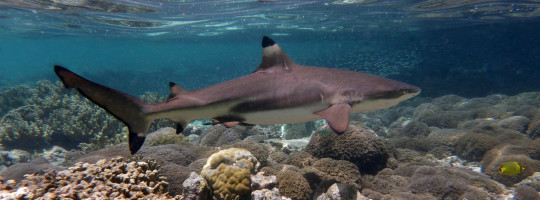
Lombok is a hotspot for marine diversity, sitting just east of the Wallace Line, a biogeographical boundary separating Asia and Australia and their respective fauna. Pristine coral gardens and around 80 species of sharks can be found in its waters. The island is also part of the world’s largest shark-fishing nation. Only the whale shark (Rhincondon typus) is protected in Indonesia; all other sharks can be legally caught.
The Dorsal Effect first launched in 2013, a year after Suhardi met Singaporean ecologist Kathy Xu, who had traveled to Lombok to find out more about the shark trade. The diminutive but quietly determined Xu wanted to protect sharks, but because she knew shark fishing was poorly paid and dangerous, she wanted to hear the fishermen’s stories too. They told her how once they could fish for sharks close to shore, but now with the shark population dropping, the fishermen said they needed to travel farther out to sea, only to come home with a relatively poor catch. The reduced catch also meant reduced pay, so they often couldn’t cover their costs...
Yet, when Xu asked why fishers didn’t seek out another trade, she learned they didn’t want to be separated from the sea. They saw it as part of their heritage.
But as they spoke longer, the shark fishermen talked about the coral gardens that could be found under the waves, ones that only they knew about. Inspired by a whale shark diving trip she’d taken with scientists on the Great Barrier Reef, Xu had an idea. “If such spots exist,” she recalls telling the fishers, “I could take tourists out with you and pay you more than you earned shark fishing”.
At first, Xu guided the former shark fishermen on how to become eco-friendly tour operators. They dropped anchor away from the reef, served guests plant-based dishes, and made sure all trash was taken back to shore. But then Xu saw that something special was happening: The former fishermen had started to take the guest experience into their own hands, making sure tourists felt at home. Suhardi painted “Welcome” in large letters over the front of his boat, fitted green baize to the top deck for outdoor seating, and hung curtains in the cabin so his guests could enjoy some shade.
Suhardi has already bought a new boat with his earnings from snorkeling trips. “Every day is my best day,” laughs Suhardi, whose smile always travels from his mouth to his eyes.
While they were receiving tourists from across the globe, there was another group that Xu wanted to reach out to. “I think it was the teacher in me who felt impassioned about influencing the young,” she says. She reached out to schools and created a five-day program that would help students understand the shark trade and local conservation efforts. During the program, paid for by the school and students, participants would not only meet the ex-shark fishermen so they could ask them about their lives, but also hear from NGOs such as the Wildlife Conservation Society about their efforts to slow the trade. The Dorsal Effect also hired marine biologists to host nightly lectures and help the students with their field surveys...
The students were faced with the realities of the fishing trade, but they were also encouraged to take a balanced view by The Dorsal Effect team. The villagers weren’t just taking the fins, and throwing away the rest of the shark; they processed every piece of the animal. While they did sell the meat and fins to buyers at the market, they also sold the teeth to jewelers, and the remains for pet food.
The Dorsal Effect also takes students on an excursion to the fishermen’s village, a small island that lies off the coast of Lombok. Marine biologist Bryan Ng Sai Lin, who was hired by The Dorsal Effect team, says that on one trip with students he was surprised by how quickly the young people understood the situation. “One of them said it’s good to think about conservation, but at the same time these people don’t really have any other choice,” Lin says....
Conservation scientist Hollie Booth of Save Our Seas, which does not work directly with The Dorsal Effect, says the need to provide legal profitable alternatives to shark fishing is critical: “We are never going to solve biodiversity and environment issues unless we think about incentives and take local people’s needs into account. These kinds of programs are really important.”"
-via Mongabay, December 15, 2023
#shark#sharks#fish#marine biology#marine animals#sea creatures#fishing#marine life#marine conservation#endangered species#overfishing#indonesia#lombok#school#field trip#ocean#pacific ocean#biodiversity#conservation#environmentalism#fishermen#scuba#scubadiving#underwater#diving#coral reef#ocean life#good news#hope
702 notes
·
View notes
Text



Ever wonder what role corals play in tropical reef ecology? Find out by taking up the mantle of Team Coral! Cover the reef with colonies clad in sturdy calcium carbonate and fend off dastardly, quick-growing algae!
#What is your favorite reef creature you'd love to see in Benthos#benthosgame#tell me#we'll put it in there#haha just kidding#unless...?#marine biology#marine biology art#marine conservation#reef science#coral reef#coral#algae#board games#card games#card game design#card art#tabletop games#game development#digital illustration#science illustration#stem education#oceanography#marine ecology
47 notes
·
View notes
Text
Via Sanjana Gajbhiye at Earth.com
The African penguin has lost 97 percent of its population, and unless we step up, they could vanish in less than 4,000 days. It’s not often that a species gets the dubious honor of being the first to meet certain criteria. However, the African penguin has become the first of 18 global penguin species to be classified as “Critically Endangered.” We cannot overlook the gravity of this situation. SANCCOB, BirdLife South Africa, and Blue Marine are raising their voices, appealing to the government and the global community to act now to save the endangered African penguin. For conservationists worldwide, the IUCN Red List is the gold-standard tool for assessing extinction risk. It’s like a medical chart for biodiversity, indicating which species are at risk and which are critically close to extinction. To date, the IUCN Red List includes 163,040 species. Overall, 45,321 of these species are threatened with extinction. The uplisting of the African penguin to “Critically Endangered” is a red flag, signaling the urgent need for collaborative action.
The largest threat to the African penguins seems to be competition with commercial fishermen as well as environmental change and pollution. SANCCOB started a petition to increase the no-take fisheries zones needed for African penguins to survive.
54 notes
·
View notes
Text
I forgot about this account lol
Here’s some sea slugs from my stay with Marine Conservation Philippines in *cough* 2022 for your amusement









What I think these blorbos are (please educate me if I’m wrong XD):
A chromodoris nudibranch maybe? Like glossodoris? Help
*cries* I don’t knowww
Nembrotha lineolata
Chromodorid nudibranch (Goniobranchus kuniei?)
Chromodoris annae
Nembrotha kubaryana
Pleurobranch (Pleurobranchus forskalii)
Blue dragon nudibranch (Pteraeolidia ianthina. Not glaucus lol)
Dotted/funeral nudibranchs (Jorunna funebris)
#girl help there’s SO many nudi species#when I click on even just one genera it feels neverending#I adore it#Anyways. Send nudies#nudibranch#dive photography#philippines#Dumaguete#marine conservation#marine conservation Philippines#sea slug#plerurobranch#marine photography#macro photography
20 notes
·
View notes
Text
splatoon fans be like "omg commander tartar is so fucked up he kills fictional octopus people!" and then "guys i had baby octopus takoyaki it was so yummy!" the very next post
like, you're not okay with a fictional telephone causing the ego-death of fictional octopus people so they can be part of something greater, but you are okay with murdering real octopuses (who are obviously people) for pleasure? get real
17 notes
·
View notes
Photo

Vessel sound is temporarily causing hearing loss in squids
Globally, anthropogenic sounds have become louder and more persistent, however, little is known about how invertebrates detect and respond to human-made sound. Now, new research shown noise associated with boats causes causes temporal hearing loss in squids across different stages of their life cycle.
The hummingbird bobtail squid (Euprymna berryi) has a short lifespan of at least 6 months, which make them a convenient animal for lab studies. Hearing and behavioural observations were made by researchers before, during and after 15 minutes of vessel sound playback, to test how these squids react to noise pollution, and noted that these squids decrease their hearing sensitivity after exposure to noise, and particularly noise affected juveniles. Juvenile squids experienced an important hearing loss sensitivity after noise exposure between 400 and 800 Hz, while adult and mature squids decreased their sensibility after 200 to 600 Hz exposure, showing more resistence. All squids recovered auditory sensitivity within two hours.
Researchers aim the inclusion of cephalopods within management and policy, because anthropogenic activities and associated sound levels in the ocean are increasing, while the role sound plays in cephalopod life history is only just beginning to be understood.
Photo by Pascal Girard
Reference () Putland et al. 2023. Vessel sound causes hearing loss for hummingbird bobtail squid (Euprymna berryi). Frontiers in Marine Science
#Euprymna berryi#hummingbird bobtail squid#science#biology#marine conservation#conservation#sciblr#scienceblr#bioblr#biologyblr#marine biology
325 notes
·
View notes
Text
“We often talk of saving the planet, but the truth is that we must do these things to save ourselves. With or without us, the wild will return.”
Sir David Attenborough
#marine biology#marine conservation#marine life#sea life#student#climate activism#climate change#david attenborough#nature#biodiversity#conservation
262 notes
·
View notes
Text
You guys want Orca pun tea that helps fund orca conservation and research in the Salish Sea? (The names are, of course, based on the names of these three bull Transient orcas, all with big reputations)
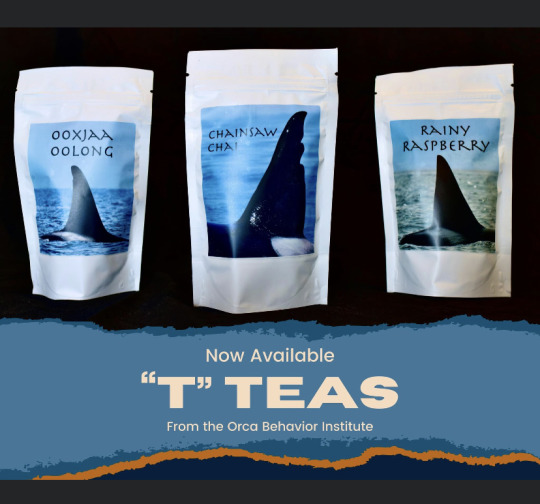
#orca#marine biology#marine conservation#transient orca#transient killer whales#Biggs killer whales#Ooxjaa#chainsaw#rainy
82 notes
·
View notes
Text
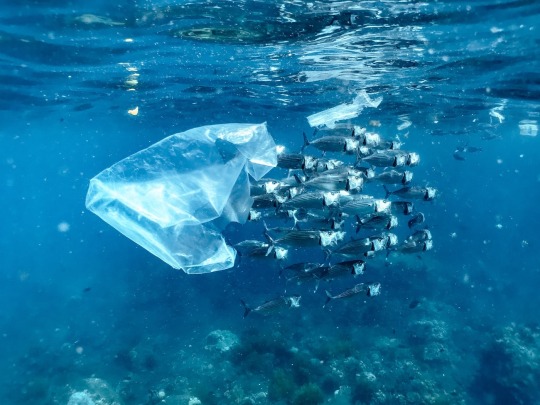
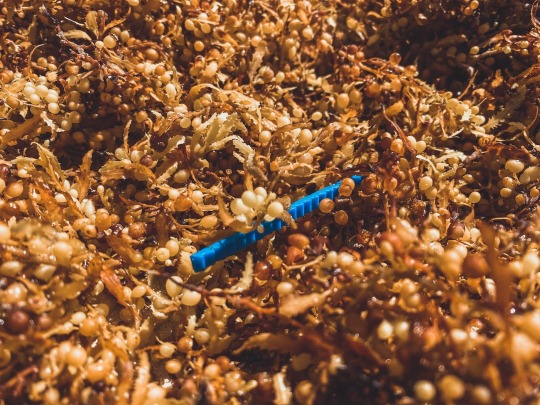
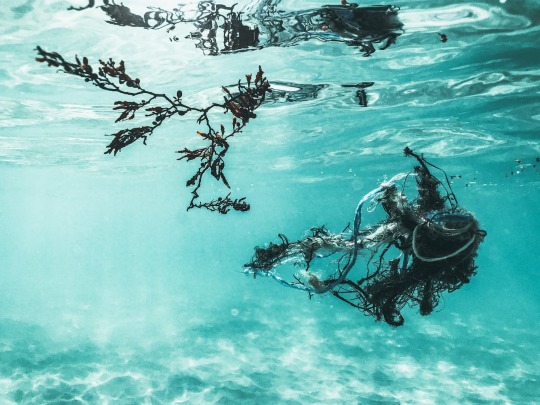
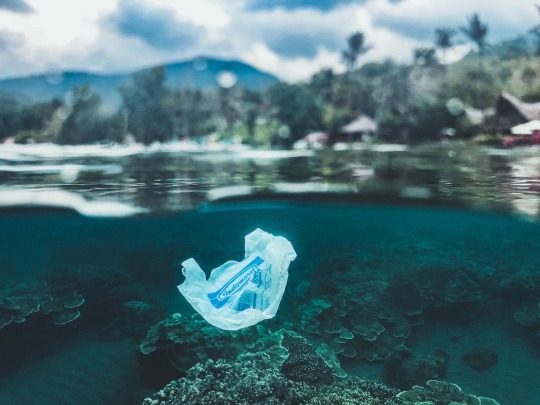
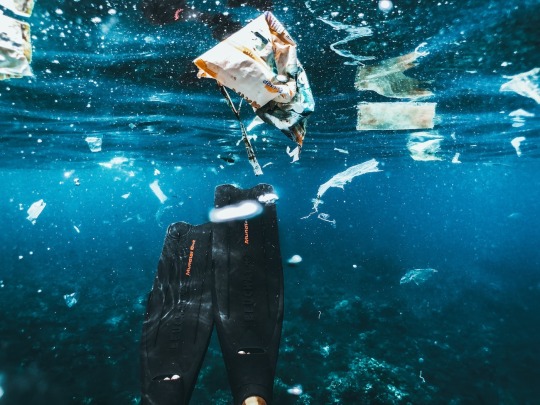

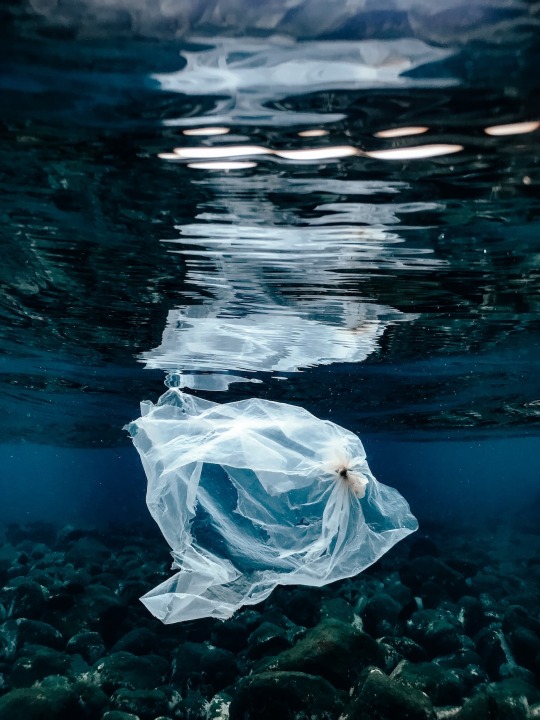
Powerful Photos by Naja Bertolt Jensen
#ocean#sea#underwater#animal#saltwater#photography#water#fish#dive#pollution#seaweed#algae#sea life#marine animal#marine wildlife#marine conservation#marine ecosystem#ocean conservation#ocean life
69 notes
·
View notes
Text
While on a shark dive, it is important to respect their space as they are wild animals. That said, these nurses were definitely seeking out interaction, and the divemaster had a safe, touch-free compromise at the ready!
#sharks#nurse shark#marine biology#marine bio#biology#zoology#animals#nature#ocean#cute animals#marine science#elasmobranchs#shark diving#scuba#scuba diving#marine conservation#ecology
1K notes
·
View notes
Text
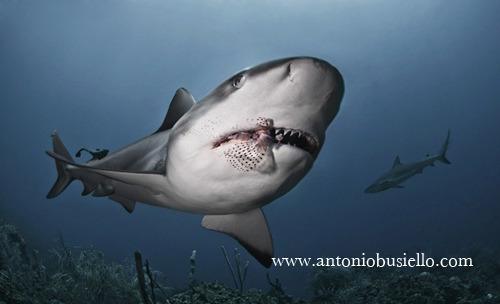
Usually, sharks don't have much interest in lionfish--this is due partially to their venomous spines, but also to the fact that the sharks don't recognize the nonnative fish as prey. The lack of predation by native predators like sharks is part of what makes lionfish such a damaging invasive species.
However, sharks became more interested after spearfishermen working to cull invasive lionfish started feeding the fish they were killing to nearby sharks. After receiving many lionfish "handouts", the fishermen observed sharks hunting and eating lionfish on their own.
This spurs hope that sharks could be "taught" to view lionfish as a viable source of food and contribute to limiting their numbers.
#cw animal death#shark#marine conservation#reef conservation#biodiversity#endangered species#invasive species#lionfish#fishing#good news#hope#environment
497 notes
·
View notes
Text
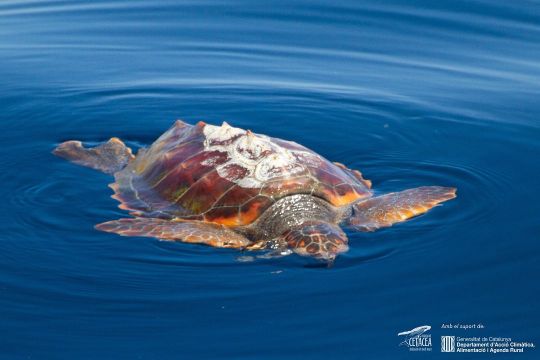
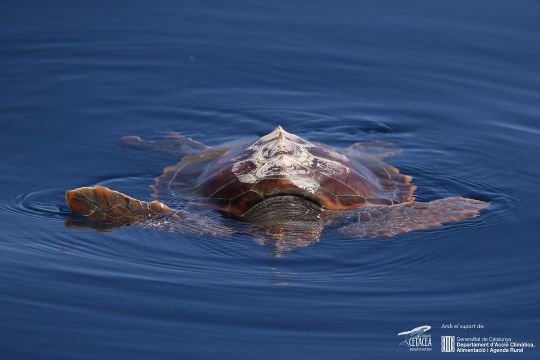
Information translated from Associació Cetàcea.
Photos taken by David Jara and Abel Tomás in the project "Foto-identificació: Balenes i dofins al litoral català" of Associació Cetàcea, with authorization and support from the government.
The loggerhead sea turtle (Caretta caretta) is the most common sea turtle in the Mediterranean sea. It used to be abundant, but nowadays is classified as Vulnerable by the IUCN.
🐢🌊
Loggerhead sea turtles spend most of their lives at sea, but since they're reptiles they need to lay eggs on land. For this reason, females look for calm beaches, without much light nor noise. This is difficult, because humans have occupied almost all the coast.
When the eggs hatch, the newborn turtles are very vulnerable to noise and light, because they depend on them to head towards the sea. A very lit promenade can confuse them and make them go towards the coast instead of towards the sea, with the dangers that this entails.
Climate change can also affect this species. When the eggs are in the sand, the sand's temperature determines the baby's sex. When temperature rises, the usual balance between males and females will shift towards a higher proportion of females. In the long term, this can cause instability in the populations.
Once in the water, dangers continue, because the turtles are susceptible to ingesting floating plastics such as bags or balloons, because they mistake them for their prey: jellyfish. Accidental ingests of plastic are abundant, which cause them intestinal problems and even death. The turtles' risk can also come from main life sources: fishing nets -abandoned or in use- are a deadly trap for these animals.
Protecting sea turtles is in our hands. Let's be careful when we meet these animals, be aware if it's the laying eggs season and avoid ocean pollution.
#natura#animals#wildlife#caretta caretta#sea turtle#sea#mediterranean#wildlife photography#marine conservation#marine animals#wanderlust#earth#climate change#animal conservation#ecology#climate emergency#turtle#turtles
112 notes
·
View notes
Text
The orca uprising: whales are ramming boats – but are they inspired by revenge, grief or memory? | Whales | The Guardian
One of the things this article mentions is that the Gibraltar orcas targeting boats are thinner than we might expect and probably hungry.
We might joke about an orca uprising, it's entirely possible they are attacking boats as a form of revenge, but we ought to also be thinking about how all our actions are negatively impacting the ocean and the food sources that orcas rely on.
Another thing the article mentions is how loud we've made the ocean - imagine being an elderly orca and you remember when the sea was quiet. And now you're constantly being buffeted by sonar.
138 notes
·
View notes
Text
Happy Earth Day everyone 🌎🌍🌏
Now, there's been a lot of shit going on for our environment. It can basically be summed up in this GIF

I don't have the energy to list all the environmental atrocities, but I do have ways to help.
Listen to climate experts. Things are scary right now and the weather is wild, but despite everything the general consensus is that we are not doomed. Stop buying into climate doomerism.
Read a book about the environment! Personally, I love Braiding Sweetgrass by Robin Wall Kimmer, What If We Get It Right? by Ayana Elizabeth Johnson, How To Blow Up A Pipeline by Andreas Malm, and Emergent Strategies by Adrienne Marie Brown
Donate your time and/or money! See if there's a citizen science event near you! Or, if you're lucky enough to live by the ocean, find a beach clean up! There are also many environmental charities that desperately need donations like The Indigenous Environmental Network, Sierra Club, Earth Justice, and The Nature Conservancy. If you're in the U.S, you can donate to the National Parks Foundation
Learn how to identify plants and plant some native species in your garden! This website helps you find seeds to plant.
Thrift, thrift, thrift! Fast fashion is one of the largest polluting industries. Who needs Shien?
Take public transportation or walk/bike/scooter if you can
And last, but most importantly, call your representatives and DEMAND environmental action. If you live in the U.S, 5 Calls has phone numbers and scripts for your call.
Don't forget, we're all in this together! Happy Earth Day!

#earth day#save the earth#environmentalism#marine biology#biology#conservation biology#marine conservation#climate optimism
14 notes
·
View notes